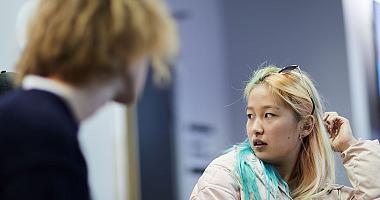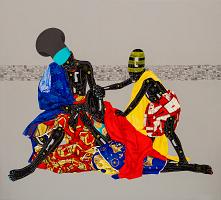PGDip Film and Screen Studies
Content navigation menu
Why study PGDip Film and Screen Studies at Goldsmiths
The PGDip in Film and Screen Studies offers a unique combination of critical and creative approaches to the past and the future of audiovisual media.
- The Postgraduate Diploma in Film and Screen Studies will equip you with skills and knowledge to address current transformations of moving image media in a globalised world, from the media in your pocket to architectural screens.
- It explores both the old and the new, philosophy and history, theory and practice, so as to help you understand the challenges of the 21st century's culture of moving images, changing artistic and political contexts as well as ever-developing technologies.
Learn from the experts
- What distinguishes the PGDip Film and Screen Studies is its innovative approach to learning and research. It takes you well beyond the borders of traditional film studies. It encourages you to think critically and imaginatively, across media forms, disciplinary boundaries as well as conceptual and creative work. The Media Arts pathway gives you the opportunity to submit some work in non-traditional forms.
- Teaching draws on the diverse research strengths of the globally renowned academics at one of the world's leading media, communications, and cultural studies schools, which also has strong traditions in audiovisual practice.
- You'll be taught by scholars of international standing who have expertise in the interface between film criticism and creation; new screen technologies; in early cinema and the media archaeology of modernity; in artist’s film; and in non-fiction film (eg documentary and avant-garde).
- The School of Media, Communications and Cultural Studies has been ranked second in the UK for 'world-leading or internationally excellent' research (Research Excellence Framework, 2021) and 16th in the world (third in the UK) in the 2024 QS World Rankings for communication and media studies.
Contact
If you have specific questions about the degree, contact Rachel Moore.
Length
1 year full-time; 2 years part-time
Entry requirements
Applicants will normally have, or expect to gain a first degree of at least second class standard (or equivalent).
Fees
Home - full-time: £7900
Home - part-time: £3950
International - full-time: £15400
School
Choose a pathway
Media Arts Pathway
The most intense and extreme forms of media, experimental media arts, test to breaking point our established ideas and practices. From wild abstraction and surrealist visions to activist and community arts, they ask the profoundest questions about high art and popular culture, the individual and the social, meaning and beauty.
This pathway explores these emerging experimental practices of image-making and criticism. You will be encouraged not just to study but to curate and critique past, present, and future media arts by building exhibitions and visual essays of their own. Short practical workshops will enable you to make the most of the skills you bring into the programme.
Moving Image Studies Pathway
The moving image media today are a concentrated form of culture, ideas, socialisation, wealth and power. 21st-century globalisation, ecology, migration and activism fight over and through them. How have the media built on, distorted and abandoned their past? How are they trying to destroy, deny or build the future?
This pathway explores new critical approaches that address the currency of moving image media in today's global context – their aesthetics, technology and politics. It seeks to extend the boundaries for studying moving images by considering a wider range of media and introducing students to a wider range of approaches for investigating moving images' past and present.
What you'll study
| Module title | Credits |
|---|---|
| Archaeology of the Moving Image | 30 credits |
| Experimental Media | 30 credits |
Optional modules
You will also choose modules worth 60 credits from a list made available by the school.
Note about optional modules (if available): The above is indicative of the typical modules offered, but is not intended to be construed or relied on as a definitive list of what might be available in any given year. The module content and availability is subject to change.
How you'll be assessed
Taught sessions and lectures provide overviews of themes, which students are encouraged to complement with intensive reading for presentation and discussion with peers at seminars. Assessments build on lectures and seminars so students are expected to attend all taught sessions to build knowledge and their own understanding of their chosen discipline.
All assessed work is accompanied by some form of feedback to ensure that students’ work is on the right track. It may come in a variety of forms ranging from written comments on a marked essay to oral and written feedback on developing projects and practice as they attend workshops.
Entry requirements
Applicants will normally have, or expect to gain a first degree of at least second class standard (or equivalent).
International qualifications
We accept a wide range of international qualifications. Find out more about the qualifications we accept from around the world.
If English isn’t your first language, you will need an IELTS score (or equivalent English language qualification) of 6.5 with a 6.5 in writing and no element lower than 6.0 to study this programme. If you need assistance with your English language, we offer a range of courses that can help prepare you for postgraduate-level study.
How to apply
Apply directly to Goldsmiths using our online application system.
Find out more about applying for a postgraduate qualification at Goldsmiths.
Fees and funding
Annual tuition fees
These are the PG fees for students starting their programme in the 2025/2026 academic year.
- Home - full-time: £7900
- Home - part-time: £3950
- International - full-time: £15400
If your fees are not listed here, please check our postgraduate fees guidance or contact the Fees Office, who can also advise you about how to pay your fees.
It’s not currently possible for international students to study part-time under a student visa. If you think you might be eligible to study part-time while being on another visa type, please contact our Admissions Team for more information.
If you are looking to pay your fees please see our guide to making a payment.
Funding opportunities
Explore the Goldsmiths scholarships finder to find out what funding you may be eligible for.
Paying your fees
Find out about paying your tuition fees.
If you are a UK student you may be eligible for a postgraduate loan.
Find out more about postgraduate fees and explore funding opportunities. If you're applying for funding, you may be subject to an application deadline.
Additional costs
In addition to your tuition fees, you'll be responsible for any additional costs associated with your course, such as buying stationery and paying for photocopying. You can find out more about what you need to budget for on our study costs page.
There may also be specific additional costs associated with your programme. This can include things like paying for field trips or specialist materials for your assignments. Please check the programme specification for more information.
Careers
This programme could lead to work in:
- Film and video distribution
- Museums
- Film and television criticism
- New media criticism
- New media art
Also, other jobs associated with screen culture, as well as further academic study.





